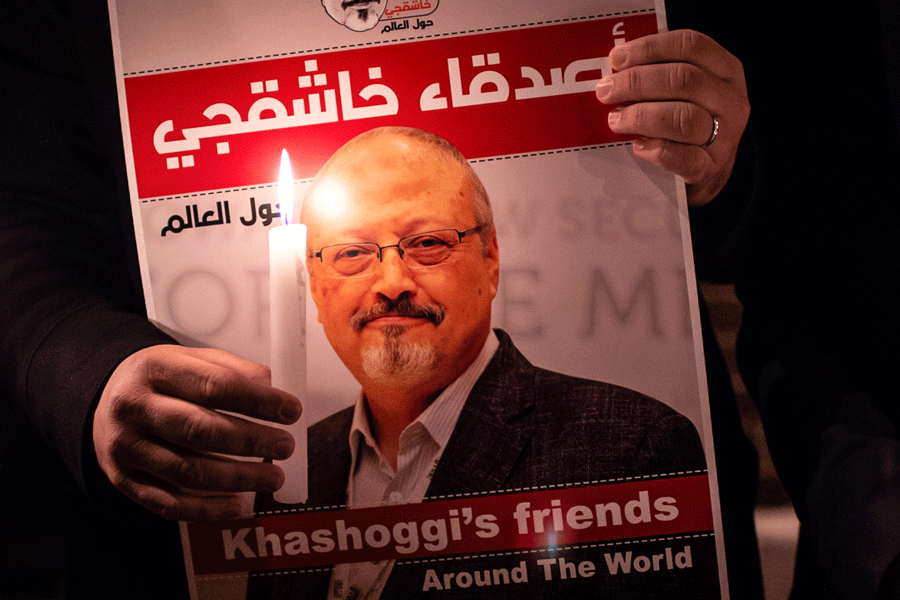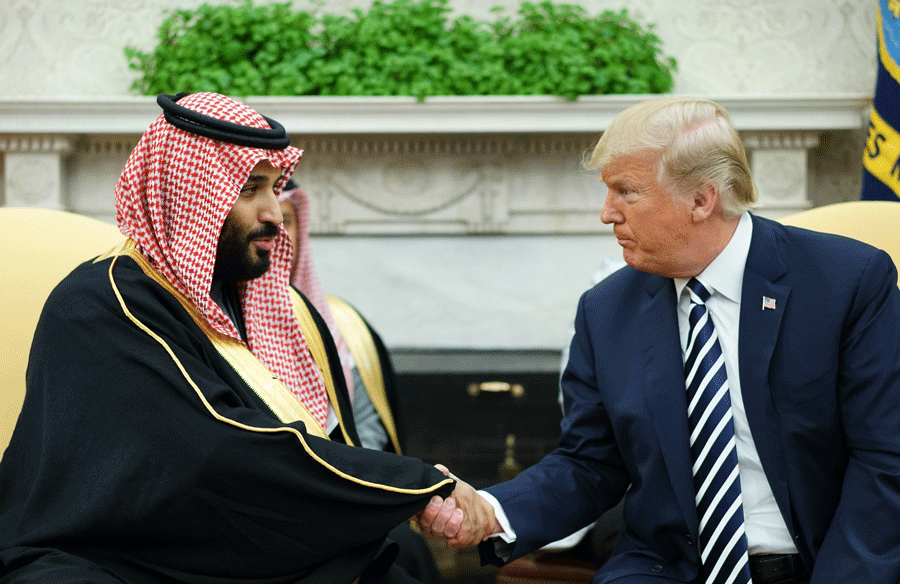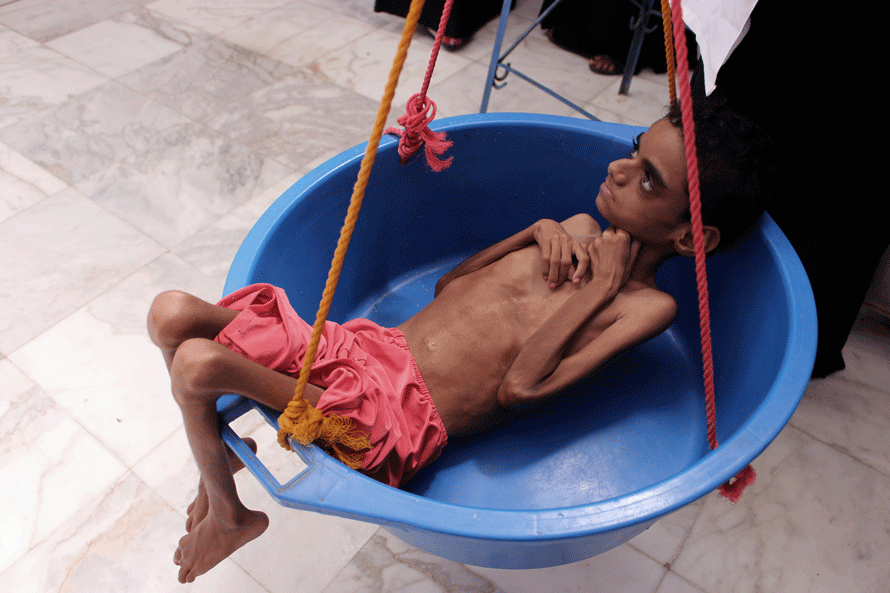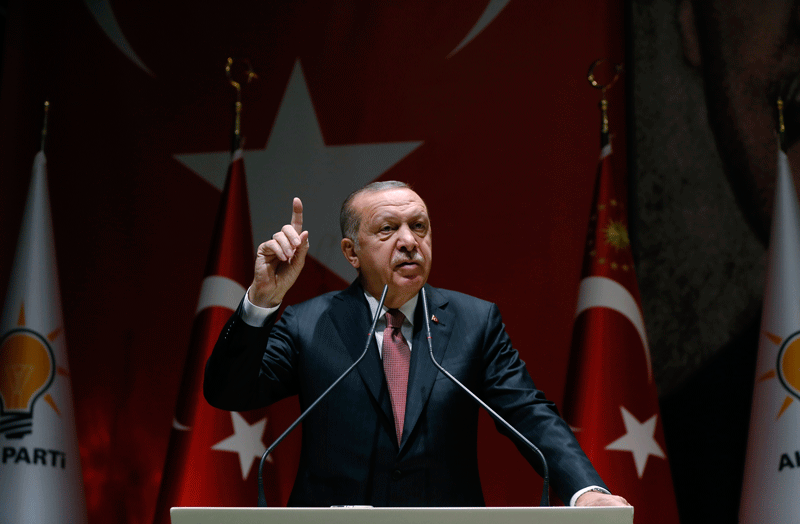Dial ‘MBS’ for Murder
By Mahir Ali | International News | Published 7 years ago

A demonstrator holds a poster of Jamal Khashoggi outside the Saudi consulate in Istanbul.
Jamal Khashoggi’s murderers were waiting for him when he entered the Saudi Consulate in Istanbul, on October 2. Most of them had arrived in Turkey earlier that day, and lost little time in getting on with their deadly task. He was, apparently, dragged out of the consul general’s office.
Khashoggi was tortured, not to extract any information, but just for someone’s amusement. They cut off his fingers first, quite possibly because his ‘crimes’ were committed in his capacity as a journalist. After some unimaginably agonising moments, his body was injected with something or the other. It may have been a lethal dose. He took seven minutes to die. The Saudi sadists began dismembering him before his heart stopped beating.
Senior Turkish officials began anonymously leaking much of this information within a couple of days of Khashoggi’s disappearance. The gory details kept piling up, while the Saudis initially feigned ignorance. Yes, Khashoggi had visited the consulate that day, they conceded, before insisting he had departed shortly afterwards, after concluding his business.
Khashoggi had also visited the consulate the previous week. The 59-year-old was keen to finalise paperwork to formalise his divorce. He wished to remarry. His Turkish fiancee, Hatice Cengiz (the Turkish spelling for Khadija Changez), was waiting outside the consulate. Khashoggi had left his phones with her, because they were not allowed in the consulate. He had also given her the number of a close Turkish friend, a senior aide to Recep Tayyip Erdogan, and asked her to call the man if Khashoggi didn’t reappear.
By the time she did, it was already far too late. Khashoggi had left the premises. Not alive, though. And most probably not in one piece.
There is only one man who could have ordered such an audacious hit in another country. He is the same man who, after Khashoggi escaped Saudi Arabia last year and shortly afterwards became a columnist for The Washington Post, tried to persuade him to return, with the offer of a senior advisory post. But Khashoggi refused to fall into the trap. He is also the same man who eventually offered condolences to Khashoggi’s family, and insisted on a photo-op with his eldest son before permitting the latter – a dual citizen who had hitherto been denied the right to leave the country – to depart for the United States, reportedly on American insistence.
His name is Mohammed bin Salman (commonly abbreviated to MBS) and Khashoggi’s self-exile was a direct consequence of the former’s elevation to the post of Crown Prince. The long-time journalist and royal family insider did not, by any means, disagree with the new heir apparent’s reform agenda, including the potentially transformative Saudi Vision 2030.
Having served in various senior capacities across the Arabic and English-language press in Saudi Arabia, Khashoggi had long been advocating the kind of concessions to common sense that MBS also appeared to favour, including lifting the unparalleled curbs on female drivers. No other nation, no matter how misogynistic in its make-up or Islamic in its pretensions, has ever formally banned women from driving. In lifting the Saudi ban, though, the crown prince did not embrace, however metaphorically, the women who had been agitating for exactly this small step for decades. In fact, the leading activists were incarcerated before the change of policy, and the remainder were warned not to express their support for the measure. One woman got into trouble for tweeting the single word – “Alhamdulillah.”
This is the aspect of MBS’s ‘reforms’ that spooked Khashoggi. He had been targeted in earlier periods for advocating mild and gradual reforms, losing a few jobs in the process. A Bahrain-based Arabic TV channel he worked for, went off-air just a couple of days after its inauguration, after it aired an interview with a Shia member of the Bahraini opposition. However, never before had there been any serious threat of incarceration or violence.

Through thick and thin: Crown Prince Mohammed bin Salman and US President Donald Trump in the White House
Khashoggi was close to members of the ruling family – to the extent that visiting foreign journalists relied on him for an insight into the House of Saud’s way of thinking – and it is said that former Saudi intelligence chief, Prince Turki bin Faisal, took him on as an aide when he was appointed as ambassador to the US and then Britain, partly to keep him out of mischief.
Things changed with the advent of MBS, initially as deputy crown prince and defence minister – in which capacity he lost little time in launching a far bigger crime than the butchering of one journalist. He launched an assault on Yemen, ostensibly against the Houthis, who were believed to be proxies for Iran. That was always a vastly exaggerated claim, as even the pre-Trump White House acknowledged. As is usual in such cases, it was claimed that the offensive would end within months, if not weeks.
More than three years later, children and other civilians continue to routinely be targeted. Yemen’s present and future is being systematically choked by rampant disease and mass starvation. It is these continuing outrages, rather than the gruesome murder of Khashoggi, that should have rung alarm bells for the countries supplying arms (and invaluable logistical assistance) to Saudi Arabia and its chief co-criminal in this endeavour, the United Arab Emirates.
But no such luck. Even after the atrocity in Istanbul has incontrovertibly demonstrated the psychopathic tendencies of the thirty-something in charge of affairs in Riyadh, the leading arms merchants – the US, Britain, France, even Spain – have declared their intention to carry on with their nefarious trade. Donald Trump is characteristically blunt about the billions of dollars at stake, but only Germany, a relatively insignificant supplier, has had the decency to rule out arms sales to the Saudis.
At least initially, Jamal Khashoggi was not particularly perturbed by the assault on Yemen, which was dubiously framed as pushback against Iranian influence via the Houthi militias. Coincidentally or otherwise, the Houthis are also the bete noire of Al-Qaeda in the Arabian Peninsula (AQAP), so one can hardly ignore the implicit backing of western powers for the outfit reputedly behind terrorist attacks from the Gulf of Aden to Paris.
Khashoggi was less impressed by the ostracisation and near-invasion of Qatar, the latter averted only by the fact that the marginally maverick Gulf state hosts the largest US base in the region. It turned out to be yet another foreign policy failure for MBS, given that Qatar is essentially doing fine, with a bit of help from Turkey and Iran.

Saudi-invoked sufferings: A malnourished child at a hospital in Yemen.
Khashoggi has posthumously been maligned by the Saudi and Israel lobbies as a covert Islamist whose sympathy for the Muslim Brotherhood – declared a terrorist organisation by the Saudis and their Emirati acolytes – may have stretched to membership. The fact is that Khashoggi was not particularly secretive about his views on the Brotherhood, and was appropriately appalled when Egypt’s elected president Mohamed Morsi was overthrown with Riyadh’s backing and the nation effectively reverted to a military dictatorship under Abdel Fattah el-Sisi, whose rule has proved even more brutal than that of Hosni Mubarak.
Khashoggi, unlike much of the rattled Saudi hierarchy, was enthusiastic about the short-lived Arab Spring and disappointed by its aftermath. But at the back of his mind was an urge for greater democratisation of the Arab countries, and he was alarmed by the path MBS was taking by combining long overdue reforms with a clampdown on free expression. The journalist made no secret of why he left Saudi Arabia (and his family) last year. He did not wish to be arrested – as many of his friends and acquaintances indeed were soon afterwards – and wanted to be able to freely express his views.
He was able to do that in America. The Washington Post received his last column on the day after he disappeared, and held back from publishing it for a couple of weeks in the hope that Khashoggi would turn up alive. Its topic was the freedom of expression in the Arab world.
In time, the Saudi explanation for the disappearance switched to an acknowledgement that Khashoggi had indeed died in the consulate, but it was an accident after he got into a fistfight or, alternatively, resisted a plan to return him to Saudi Arabia. Eventually, the Saudi public prosecutor acknowledged late last month that the killing was premeditated. The hit squad has been imprisoned and, it is promised, will go on trial. The deputy intelligence chief who reportedly cursed Khashoggi as he watched the proceedings on Skype, has lost his job. It won’t be particularly surprising if most of these people are publicly beheaded at the behest of the thin-skinned rogue whose orders they diligently followed.
Erdogan, who himself has been ruthless in his treatment of journalists (albeit without chopping up any of them into pieces), has been playing his own geopolitical game. He would be thrilled to see MBS sidelined. But anyone who assumes that that is what lies in store, ignores the fact that the crown prince consolidated power by surrounding himself with loyalists and excommunicating all doubters, including many of his cousins. He shall not be moved, let alone removed, without some kind of a concerted revolt within the degenerate House of Saud or a revolution in the world’s only nation named after a family.

The truth is out there: Turkish President Recep Tayyip Erdogan in Parliament.
From Mexico to Myanmar and from Pakistan to Russia, it is, sadly, hardly uncommon for journalists to be targeted by the state, sometimes fatally. Yet the manner of the eminently respectable Khashoggi’s extermination stands out as an exceptional instance of government brutality, unprecedented within living memory in its viciousness.
It has been reported that MBS, upon becoming Crown Prince, invited western experts to brief him on Vladimir Putin. According to one of them, what MBS really wanted to know was: how does he get away with it? He may have resisted the realisation that Putin presides over the world’s second largest nuclear power. Russia has a great deal more weight to throw around than the richer yet pathetic desert kingdom. Despite everything, however, in this case at least, Jared Kushner’s best friend will indeed get away with it. It’s a pity, but hardly a surprise in a world where the likes of Trump, Putin, El Sisi, Netanyahu, Duterte and, soon enough, Brazil’s Bolsonaro, hold sway.
Heads will likely roll in Saudi Arabia, but the one that really counts will stay in place for far too long, with much harm to come for the benighted and devastated region.
Shortly after funeral prayers – necessarily in absentia, because his remains are believed to have been dissolved in acid within hours of his assassination – were held for Khashoggi in several cities across the world, including Medina and Istanbul, the Washington Post reported that the CIA had concluded there could be no doubt that the journalist’s elimination was ordered by Crown Prince Mohammed. The conclusion was based not just on the fairly obvious perception that such an outrage could not conceivably have been put into action without explicit orders from MBS, but also on intercepted conversations between the crown prince and his younger brother, Khalid bin Salman, the Saudi ambassador to Washington, and between the ambassador and Khashoggi.
Turkey, meanwhile, purportedly has evidence that the gang leader of the team of assassins called a superior in Riyadh immediately after the murder to say: “Tell your boss the deed is done.” Even that, though, is not exactly a smoking gun – and chances are there never will be one. Erdogan has demanded an international inquiry along the lines of the United Nations’ probe into Benazir Bhutto’s assassination, but that too is unlikely. And it has been reported that the US is contemplating the extradition of Fethullah Gulen, the cleric on whom Erdogan has blamed almost all of Turkey’s woes, as a means of placating the Turkish president and persuading him to tone down his campaign against MBS.
The Trump administration has every intention of continuing to do business with the crown prince, and permitting an emerging petty tyrant to get away with yet another murder is an inconsequential concession in the context of the bigger picture, in which the Saudis and Israelis are indispensable allies in the crusade against Iran. The extent to which other western powers will continue to suck up to the psychopathic future Custodian of the Holy Shrines remains to be seen, and there are bound to be hesitations here and there, but there is little prospect in the short run of the US distancing itself from the atrocious Saudi regime.
Mahir Ali is an Australia-based journalist. He writes regularly for several Pakistani publications, including Newsline.


